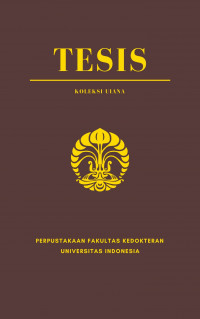Tesis
Hubungan Antara Indeks Resistif Renal dengan Kejadian Gagal Ginjal Akut pada Pasien yang Menjalani Bedah Pintas Arteri Koroner = Relationship between Renal Resisitive Index and Incidence of Acute Kidney Injury in Patient Undergoing Coronary Artery Bypass Graft.
Latar belakang: Gagal ginjal akut (GGA) menjadi salah satu komplikasi serius yang dapat terjadi setelah prosedur bedah pintas arteri koroner (BPAK). GGA paska operasi jantung secara independen berhubungan dengan peningkatan 3-8 kali lipat angka morbiditas dan mortalitas serta memperpanjang durasi perawatan (hospitalisasi) sehingga dapat meningkatkan biaya kesehatan. Untuk menurunkan insidensi GGA ini, dibutuhkan modalitas pemeriksaan sebelum operasi yang berhubungan dengan kejadian GGA paska BPAK sehingga dapat digunakan sebagai prediktor nantinya untuk tindakan pencegahan. Indeks resistif renal (IRR) diketahui dapat menggambarkan kondisi resistensi dan komplians pembuluh darah yang berhubungan dengan patofisiologi GGA paska BPAK. Namun hingga saat ini belum ada penelitian yang menilai hubungan langsung antara nilai IRR dan kejadian GGA paska BPAK. Tujuan: Mengetahui hubungan nilai IRR terhadap kejadian GGA paska BPAK Metode: Pasien yang akan dilakukan prosedur BPAK akan menjalani pemeriksaan dupleks renalis untuk mendapatkan nilai IRR. Luaran gagal ginjal akut dinilai dengan pemeriksaan kadar kreatinin darah selama 48 jam paska BPAK Hasil: Terdapat 96 pasien yang menjadi subjek penelitian. Median nilai IRR pada subjek penelitian ini ialah 0.71 (0.57-0.87). Terdapat perbedaan median nilai IRR antara kelompok GGA dan non GGA (0.73, rentang 0.57-0.87 dan 0.65, rentang 0.58-0.72). Nilai IRR memiliki korelasi yang cukup baik terhadap kejadian GGA paska BPAK (nilai koefisien korelasi r = 0.66, p < 0,001) dengan titik potong pada nilai IRR 0.685 (sensitivitas 82.40%, spesifisitas 73.30%). Faktor-faktor lain seperti usia, diabetes melitus, hipertensi, nilai kreatinin serum pre operatif, klirens kreatinin pre operatif, fraksi ejeksi, durasi mesin pintas kardiopulmonal dan durasi klem silang aorta secara statistika berbeda bermakna berhubungan terhadap kejadian GGA paska BPAK. Namun dari analisis multivariat, hanya faktor fraksi ejeksi, durasi mesin pintas kardiopulmonal, nilai IRR, dan diabetes mellitus terbukti bermakna Kesimpulan: Terdapat hubungan antara IRR dengan kejadian gagal ginjal akut paska BPAK. Nilai IRR 0.685 merupakan titik potong optimal (sensitivitas 82,40% dan spesifisitas 73.30%)
Kata Kunci: indeks resistif renalis, gagal ginjal akut, bedah pintas arteri koroner
Background: Acute kidney injury (AKI) still become one of the serious complications that can occur after a coronary artery bypass graft (CABG) procedure. Post-operative AKI is independently associated with a 3-8 fold increase in morbidity and mortality and extending the duration of treatment (hospitalization) thereby increasing health costs. To reduce the incidence of AKI, a modality of examination prior surgery which is related to the incidence of post-operative AKI is needed so that it can be used as a predictor later for preventive action. The renal resistive index (RRI) is known to be able to describe the condition of resistance and vascular compliance which are related to the pathophysiology of post-operative AKI. However, there has been no research that assesses the direct relationship between RRI values and the incidence of post-operative AKI Objectives: To investigate the relationship between RRI value and incidence of post-operative AKI in patients underwent CABG procedure. Methods: CABG candidates patients will undergo duplex renalis examination to obtain an RRI score. Outcome of renal impairment was assessed by blood creatinine examination within 48 hours after CABG procedure. Results: There were 96 patients who became the subject of the study. The median of RRI value in this study subjects was 0.71 (0.57-0.87). There were differences in median of RRI values between groups with post-operative AKI and those not (0.73, range 0.57-0.87 dan 0.65, range 0.58-0.72). There was quite good correlation between RRI and post-operative AKI (p < 0.001 with correlation coefficient r = 0.66) with cut off point of IRR value was 0.685 (sensitivity 82.40%, specificity 73.30%). Other factors such as age, diabetes mellitus, hypertension, ejection fraction, CPB duration, and aortic cross clamp duration are associated with incidence of post-operative AKI. However, multivariat analysis showed only ejection fraction, cardiopulmonary bypass duration, RRI, and diabetes mellitus significantly related to post-operative AKI Conclusion: RRI values has relationship with post-operative AKI. The optimal cut off value of RRI retrieved by this study is 0.685 (sensitivity 82.40%, specificity 73.30%)
Keywords: Renal resistive index, acute kidney injury, coronary artery bypass graft
- Judul Seri
-
-
- Tahun Terbit
-
2020
- Pengarang
-
Arif Adimulya Tasela - Nama Orang
Taofan S - Nama Orang
RITA Zahara - Nama Orang - No. Panggil
-
T20215fk
- Penerbit
- Jakarta : Program Studi Ilmu Penyakit Jantung dan Pembuluh Darah., 2020
- Deskripsi Fisik
-
xx, 49 hal; ill; 21 x 30 cm
- Bahasa
-
Indonesia
- ISBN/ISSN
-
-
- Klasifikasi
-
NONE
- Edisi
-
-
- Subjek
- Info Detail Spesifik
-
-
| T20215fk | T20215fk | Perpustakaan FKUI | Tersedia |


Masuk ke area anggota untuk memberikan review tentang koleksi